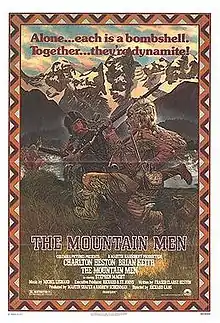The Mountain Men
The Mountain Men is a 1980 American adventure Western film directed by Richard Lang and starring Charlton Heston and Brian Keith.
| The Mountain Men | |
|---|---|
 Theatrical release poster | |
| Directed by | Richard Lang |
| Produced by | Martin Shafer Andrew Scheinman |
| Written by | Fraser C. Heston (as Fraser Clarke Heston) |
| Starring | Charlton Heston Brian Keith |
| Music by | Michel Legrand |
| Cinematography | Michel Hugo |
| Edited by | Eva Ruggiero |
| Color process | Metrocolor |
Production company | Polyc International BV |
| Distributed by | Columbia Pictures |
Release date |
|
Running time | 100 minutes |
| Country | United States |
| Language | English |
Plot
Bill Tyler (Charlton Heston) is an argumentative, curmudgeonly mountain man. Henry Frapp (Brian Keith) is Tyler's good friend and fellow trapper. Together, they trap beaver, fight Native Americans, and drink at a mountain man rendezvous while trying to sell their "plews", or beaver skins, to a cutthroat French trader named Fontenelle.
Tyler looks for a legendary valley, in Blackfoot territory, "so full of beaver that they just jump in the traps." Running Moon (Victoria Racimo) leaves her abusive husband, a ruthless Blackfoot warrior named Heavy Eagle (Stephen Macht), and comes across the two trappers in the dying days of the fur trapping era. While at first Bill only wants to take her to safety at the rendezvous, she eventually becomes his woman. While trapping Bill and Henry are attacked by Blackfeet and Henry is scalped by Heavy Eagle in front of Bill. Bill runs back to camp and he and Running Moon flee only to be caught. Later, Bill (thinking Running Moon has also been killed) is given a chance to run (similar to the real life event of John Colter) and is chased by warriors whom he initially eludes by hiding in a beaver den. They pursue him until he and Heavy Eagle fall into a raging river. Heavy Eagle makes it to shore and Bill goes over a waterfall. Heavy Eagle tries to make Running Moon his woman again which he cannot do. He knows Bill Tyler survived and will come for her as he had done.
On his survival trek Bill comes across Henry who had survived the scalping and eventually learns that Running Moon is still alive. He and Henry set out to rescue her while they are followed by a pair of trappers (Cassell and Lucking) also looking for the valley of beavers.
The story takes place during 1838, although it's never stated in the film, based on the fact that the beaver market was declining and the rendezvous was held on the Popoagie River. The "Era of the Mountain Man" ended two years later.
The story was written by Heston's son. The film was Lang's directorial debut. This was Victor Jory's last film. John Glover's character Nathan Wyeth (John Glover) was clearly inspired by the historical Nataniel Wyeth, a New England ice merchant who pioneered the marketing of Northwest salmon. Keith's character Henry Frapp could have been inspired by Henry Fraeb, a nineteenth century trapper and fur trader.
Cast
- Charlton Heston as Bill Tyler
- Brian Keith as Henry Frapp
- Victoria Racimo as Running Moon
- Stephen Macht as Heavy Eagle
- John Glover as Nathan Wyeth
- Seymour Cassel as La Bont
- Davud Ackroyd as Medicine Wolf
- Cal Bellini as Cross Otter
- William Lucking as Jim Walter (as Bill Lucking)
- Ken Ruta as Fontenelle
- Victor Jory as Iron Belly
- Danny Zapien as Blackfoot Chief
- Tim Haldeman as Whiskey Clerk
- Buckley Norris as Trapper
- Daniel Knapp as Trapper
- Michael Greene as Trapper
- Stewart East as Trapper
- Terry Leonard as Crow Brave
- Steven Chambers as Blackfoot Brave (as Steve D. Chambers)
- Bennie E. Dobbins as Blackfoot Brave (as Bennie Dobbins)
- Suzanna Trujillo as Iron Belly's Squaw
- Melissa Sylvia as Frapp's Squaw
- James Ecoffey as Dog Of the Sun
Locations
The film was shot in Wyoming at Bridger-Teton National Forest, Grand Teton National Park, Shoshone National Forest and Yellowstone National Park.
Reception
Gene Siskel and Roger Ebert selected the film as one of their "dogs of the year" in a 1980 episode of Sneak Previews.[1]
In Leonard Maltin's annual publication "TV Movies," the film is rated BOMB and described as "crude, bloody and tiresome good-guys-vs-Indians western."
Heston later said "the film that you saw was not the film that we conceived or shot. We compromised. My son's script was much darker. It emphasized the sort of autumnal recognition that they earned as trappers. I confess that I miss that aspect bitterly. My son found it difficult to swallow. He poured everything into the script and he resented the changes. But all artists compromise. Every one of my films could have been better. Every one of them. My son learned that the people who put up the money control the film. When we saw the final cut, he was heartbroken.... I could have walked out. I could have put everything on the line but I don't like to do that. It was the director's (Richard Lang) first feature and I don't like to throw my weight around. But maybe I should have. Maybe I made a mistake."[2]
See also
References
- Sneak Previews: Worst of 1980
- FOR HESTON THE KEY IS RESILIENCE: Michael Blowen Globe Correspondent. Boston Globe 21 July 1980: 1.
